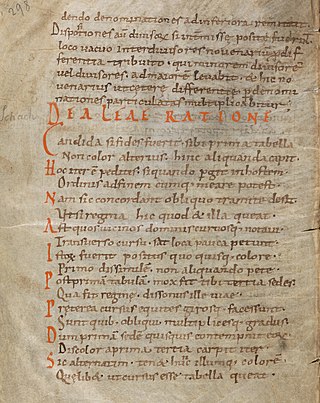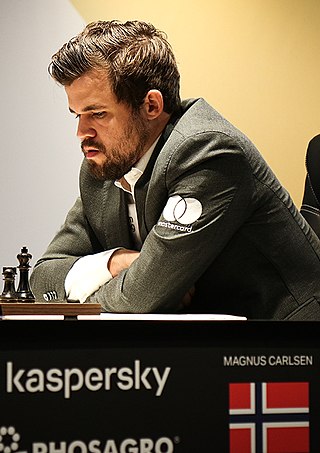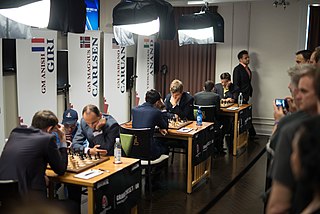
Chess is a board game for two players. It is sometimes called international chess or Western chess to distinguish it from related games such as xiangqi and shogi.
The Computer Olympiad is a multi-games event in which computer programs compete against each other. For many games, the Computer Olympiads are an opportunity to claim the "world's best computer player" title. First contested in 1989, the majority of the games are board games but other games such as bridge take place as well. In 2010, several puzzles were included in the competition.
One of the most common ways for chess historians to trace when the board game chess entered a country is to look at the literature of that country. Although due to the names associated with chess sometimes being used for more than one game, the only certain reference to chess is often several hundred years later than uncertain earlier references. The following list contains the earliest references to chess or chess-like games.

A chess club is a club formed for the purpose of playing the board game of chess. Chess clubs often provide for both informal and tournament games and sometimes offer league play. Traditionally clubs host over the board, face to face chess more than play on internet chess servers or computer chess.

Versus de scachis, also known as the Einsiedeln Poem in some literature, is the title given to a 10th-century Medieval Latin poem about chess. It is the first known European text to provide a technical description of chess for didactic purposes and it is considered a fundamental document to understand the development of chess in Europe.
This is a timeline of chess.

There are various systems of Go ranks and ratings that measure the skill in the traditional board game Go. Traditionally, Go rankings have been measured using a system of dan and kyu ranks. Especially in amateur play, these ranks facilitate the handicapping system, with a difference of one rank roughly corresponding to one free move at the beginning of the game. This system is also commonly used in many East Asian martial arts, where it often corresponds with a belt color. With the ready availability of calculators and computers, rating systems have been introduced. In such systems, a rating is rigorously calculated on the basis of game results.

The English Chess Federation (ECF) is the governing chess organisation in England. It is affiliated to FIDE. The ECF was formed in 2004 as one of the more localised successors to the British Chess Federation (BCF), an organisation founded in 1904.
The Australian Chess Federation (ACF) is dedicated to promoting the game of chess in Australia, and is a member of FIDE, the World Chess Federation.
The ECF grading system was the rating system formerly used by the English Chess Federation. A rating produced by the system was known as an ECF grading.

A chess title is a title regulated by a chess governing body and bestowed upon players based on their performance and rank. Such titles are usually granted for life. The international chess governing body FIDE grants several titles, the most prestigious of which is Grandmaster; many national chess federations also grant titles such as "National Master". More broadly, the term "master" can refer to any highly skilled chess player.

The World Blitz Chess Championship is a chess tournament held to determine the world champion in chess played under blitz time controls. Since 2012, FIDE has held an annual joint rapid and blitz chess tournament and billed it as the World Rapid & Blitz Chess Championships. The current world blitz champion is the Norwegian Grandmaster Magnus Carlsen. Valentina Gunina from Russia is the current women's blitz world champion. Magnus Carlsen has won the event a record seven times.
A chess rating system is a system used in chess to estimate the strength of a player, based on their performance versus other players. They are used by organizations such as FIDE, the US Chess Federation, International Correspondence Chess Federation, and the English Chess Federation. Most of the systems are used to recalculate ratings after a tournament or match but some are used to recalculate ratings after individual games. Popular online chess sites such as Chess.com, Lichess, and Internet Chess Club also implement rating systems. In almost all systems, a higher number indicates a stronger player. In general, players' ratings go up if they perform better than expected and down if they perform worse than expected. The magnitude of the change depends on the rating of their opponents. The Elo rating system is currently the most widely used. The Elo-like ratings systems have been adopted in many other contexts, such as other games like Go, in online competitive gaming, and in dating apps.

The London Chess Classic is a chess festival held at the Olympia Conference Centre, West Kensington, London. The flagship event is a strong invitational tournament between some of the world's top grandmasters. A number of subsidiary events cover a wide range of chess activities, including tournaments suitable for norm and title seekers, junior events, amateur competitions, simultaneous exhibitions, coaching, and lectures.

The 41st Chess Olympiad, organised by the Fédération Internationale des Échecs (FIDE) and comprising an open and women's tournament, as well as several events designed to promote the game of chess, was an international team chess event that took place in Tromsø, Norway, between 1–14 August 2014. The organiser was Chess Olympiad Tromsø 2014 AS on behalf of FIDE.

Chess is one of the most popular sports in Azerbaijan, where it is governed by the Azerbaijan Chess Federation (ACF). On May 5, 2009 Azerbaijani president Ilham Aliyev, who is also the chairman of the National Olympic Committee, signed an executive order initiating a state-supported chess development program, covering the years 2009–2014.

The Sinquefield Cup is an annual, closed chess tournament in St. Louis, Missouri, United States, honoring Rex Sinquefield and his wife Jeanne, the founders of the Saint Louis Chess Club. Since 2015, the Sinquefield Cup has been a part of the Grand Chess Tour.

The 43rd Chess Olympiad, organised by the Fédération Internationale des Échecs (FIDE) and comprising open and women's tournaments, as well as several events designed to promote the game of chess, was an international team chess event held in Batumi, Georgia, from 23 September to 6 October 2018. This was the first Chess Olympiad to take place in Georgia with the Georgian Chess Federation also hosting the Chess World Cup 2017 in Tbilisi.
Natasha Katherine Regan is a chess player and an award-winning chess author, best known for her book Game Changer. She has represented England at two Chess Olympiads.

Luka Budisavljević is a Serbian chess player. He is the youngest Grandmaster in the history of Serbia. He fulfilled requirements for achieving highest chess title Grandmaster on 29 November 2020 when he was exactly 16 years, 10 months and 7 days old, becoming the first Serbian who managed to get such an achievement before 17th birthday.












